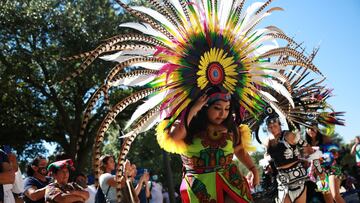Why is Indigenous Peoples’ Day celebrated in the US and when did it start? Origin and meaning
This October 14th, Indigenous Peoples’ Day will be celebrated in the USA. We explain what it is and why it is commemorated on the same day as Columbus Day.

Every year, the second Monday in October Columbus Day is celebrated. This date commemorates the landing of Christopher Columbus in the New World on October 12, 1492.
However, this is not the only celebration on this date, since the second Monday of October also commemorates Indigenous Peoples’ Day, which has replaced Columbus Day in several cities and states around the country.
On Indigenous Peoples’ Day, we honor the perseverance and courage of Indigenous peoples, show our gratitude for their myriad contributions to our world, and renew our commitment to respect Tribal sovereignty and self-determination. #IndigenousPeoplesDay pic.twitter.com/lfXtnoa9rs
— U.S. Embassy Kuala Lumpur (@usembassykl) October 13, 2024
Why is Indigenous Peoples’ Day celebrated in the US and when did it start? Origin and meaning
Although Columbus Day recognizes Columbus’s achievements and celebrates Italian-American heritage, its commemoration has generated controversy because it partially erases the suffering of Native Americans due to European colonization.
That’s why many alternatives to the holiday have been proposed, including Indigenous Peoples’ Day, which celebrates the history and culture of Native Americans, as well as recognizes the challenges they continue to face. The seeds of Indigenous Peoples’ Day were planted in 1977, when Indigenous delegates from around the world at a UN conference put forth a resolution to replace Columbus Day with an International Day of Solidarity with the Indigenous Peoples of the Americas on October 12.
South Dakota became the first state to officially recognize the holiday in 1990, replacing Columbus Day with Native American Day.
In 2021, President Joe Biden issued the first presidential proclamation for Indigenous Peoples Day. The president said in a statement that the day is meant to “honor America’s first people and the tribal nations that continue to thrive today.”
Indigenous Peoples’ Day aims to recognize the painful history that indigenous peoples have faced and celebrate their communities. Additionally, it celebrates and recognizes the resilience and diversity of Indigenous Peoples in the United States, according to the Smithsonian Institution.
You may be interested in: Hispanic Heritage Month: What is it and why is it celebrated in the United States?
After learning history of colonization, outside the textbook, many students have campaigned to abolish Columbus Day & recognize #IndigenousPeoplesDay.
— Zinn Ed Project (@ZinnEdProject) October 7, 2023
Find those locations on map ⬇️ and let us know if we can add your school, school district, or city. https://t.co/QzsrNvHtp8 pic.twitter.com/ZlRwPYrzQs
Indigenous Peoples’ Day: Is it a federal holiday?
Unlike Columbus Day, Indigenous Peoples’ Day is not a federal holiday. However, several states across the country, as well as Washington, D.C., have established holidays honoring Native Americans.
Indigenous Peoples' Day often coincides with Columbus Day or replaces it entirely. Dozens of cities and school systems also celebrate Indigenous Peoples' Day.
States observing Indigenous Peoples’ Day by proclamation include Arizona, California, Iowa, Louisiana, Michigan, Minnesota, Nevada, North Carolina, Virginia, Wisconsin and Washington, D.C., according to USA TODAY.
On the other hand, others celebrate it officially: Alabama, Alaska, Hawaii, Maine, Nebraska, New Mexico, Oklahoma, Oregon, South Dakota and Vermont.
Related stories
Additionally, more than 130 cities, including Berkeley, Seattle, Dallas, Minneapolis and Los Angeles, also celebrate Indigenous Peoples' Day.
The states that have abolished Columbus Day are: Alaska, Oregon, California, Arizona, New Mexico, Texas, South Dakota, Minnesota, Iowa, Wisconsin, Michigan, Kentucky, Virginia, North Carolina, Vermont, Maine and Florida.


Complete your personal details to comment